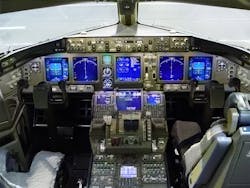Europe's Plan to Block Aviation Cyber Threats
As originally reported on The Wall Street Journal, Europe’s top air-safety official said he is hiring a group of high-level computer experts to identify and combat looming cyber threats to aviation.
Intended to be a kind of digital SWAT team for hacking attacks, the initiative launched last month goes beyond U.S. efforts and is the most dramatic example of the European Aviation Safety Agency’s increasingly aggressive approach to such risks.
The aim is to quickly provide technical assistance to carriers or national regulators anywhere in Europe in the event of a cyber-attack.
Patrick Ky, the agency’s executive director, stated that the move is also part of a broader campaign by the agency, which serves 32 member states, to expand its authority beyond traditional safety regulations.
Aviation authorities world-wide have said there hasn’t been a verified instance of an individual or a group successfully hacking into a commercial airliner’s power or flight-control systems while airborne. But, like many experts, Ky worries about growing potential threats as aircraft become more connected to ground-based computer networks, ranging from maintenance to navigation to cabin entertainment.
Ky said he has started to recruit cyber experts with the aim of reassuring political leaders and passengers that “we are ready and we are going to help” if aviation computer systems are compromised. The team will be supplemented by staff loaned from various national regulators.
Initially, the focus will be on cataloging and monitoring cyber-related hazards confronting commercial planes and other aircraft world-wide. But by late 2016, according to Ky, a core team of roughly a dozen troubleshooters should be ready to respond to specific incidents. He envisions 50 or 60 experts will eventually be dedicated to such work.
While aircrafts are “immune” to threats in the air for the time being, the EASA worries about maintenance and ground-based function that can tap into onboard computers.
How EASA will proceed, and what additional resources it will have, are expected to be a big part of the impending debate.
